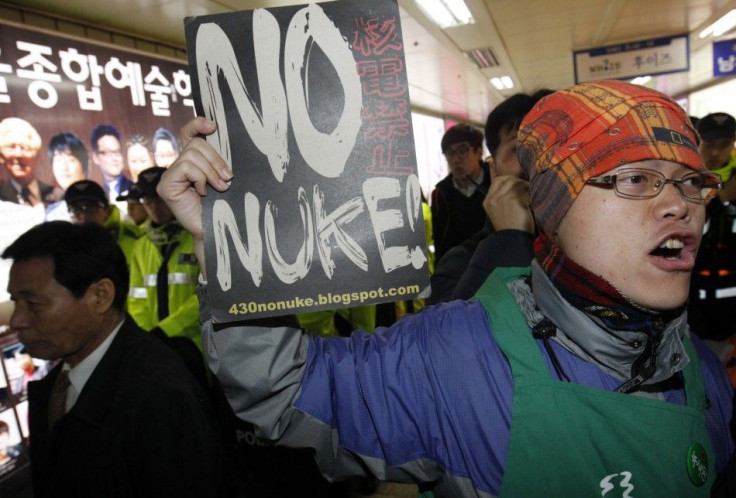Activists Protest At South Korea Nuclear Summit

Thousands of anti-nuclear activists Monday descended on South Korea's capital to protest the nuclear security summit that has attracted dozens of world leaders to discuss the challenges of safeguarding atomic power.
While the attendees, including U.S. President Barack Obama, have asserted that nations should be able to develop nuclear energy for peaceful purposes, last year's disaster at the Fukushima Daiichi plant in nearby Japan hangs like a black cloud over the summit in Seoul.
At a speech at a South Korean university, Obama lauded the benefits provided by nuclear power and cited it as a relatively clean and cheap energy source.
However, according to Voice of America, protesters in Seoul said the Fukushima meltdown indicates there is no such thing as safe nuclear power. Demonstrators, who came to Seoul from around the world, also allege that global heads of state are more interested in maximizing the profits of energy companies rather than imposing safeguards and regulations at nuclear plants.
VOA noted that outside the summit, protesters chanted: No nukes Asia, no nukes Korea, No nukes [America], no nukes anywhere!
According to the Taiwan-based China Post, one protester held a placard that read, Outcry from Fukushima calls for abandonment of all nuclear development! Another read, No nuke exports! No nuke power!
Park Jung-eun, a member of a South Korean anti-nuclear organization called People's Solidarity for Participatory Democracy, told VOA that nuclear power is dangerous and must be abandoned in favor of renewable energy sources.
Emerging countries will never give up their nuclear ambitions unless current nuclear powerhouses come forward first to make disarmament efforts, the protest organizers said in a joint statement.
A German protester, Andreas Speck, cited how pressure from the public forced Chancellor Angela Merkel to reverse her stance on expanding nuclear sites in that country by ordering the closure of all atomic power stations by 2022.
Angela Merkel extended the lifetime of German power stations just before Fukushima happened and then she was forced to do a U-turn because of people power. Yes, it shows that people, organizing, mobilizing have a lot of power, Speck told VOA.
Yonhap news agency of South Korea reported that Seoul is under the highest level terror alert during the summit, with tens of thousands of police officers deployed across the city.
Meanwhile, South Korea is seeking to boost its own nuclear power program and even has plans to build nuclear plants in the United Arab Emirates.
President Lee Myung-bak wants to transform South Korea into a leading nuclear reactor exporter, shrugging off demands by the opposition who are calling for a cessation to nuclear projects in the country.
The Korea Herald reported that Seoul wants to increase the proportion of electricity provided by nuclear energy to 59 percent by 2030 from about 30 percent now.
The government also plans to build 19 nuclear reactors, in addition to the existing 23 already in operation.
Some analysts believe South Korea has no choice but to depend more on nuclear energy because the country has no natural resources of its own and is the world's fifth-biggest importer of crude oil.
We spend hundreds of billions of dollars a year to import oil and gas. Given the lower feasibility of other renewable resources, curbing the use of atomic energy will drastically increase imports and heap extra pressure on the national economy, Lee Heon-ju, a nuclear and energy engineering professor at Jeju National University, told the Korean Herald.
© Copyright IBTimes 2024. All rights reserved.





















